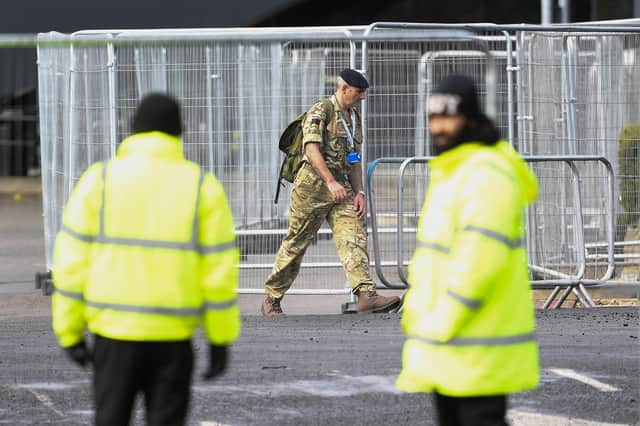Coronavirus: Is Britain now at war with Covid-19 – Alastair Stewart


As the Covid-19 lockdown continues, we have the unfortunate irony that Boris Johnson is bunkered down with the disease. Very early on, the Prime Minister framed his Government's response as analogous to the Second World War. But is Britain really at war or handling a protracted medical crisis?
The difference is important for how we understand the severe curtailments on our daily lives. The PM has already convened a daily war cabinet with the Health Secretary, minister for the Cabinet Office, Chancellor and Foreign Secretary.A formal declaration of 'war' has far more utility than the drama and mystery of the 'C-19' group. It would give the Prime Minister and the Government the moral justification to defend the citizenry while curtailing liberty and mobilising the economy, military and manpower of the nation.
Advertisement
Hide AdAdvertisement
Hide AdUnder the royal prerogative, the PM, in the Queen's name, can declare war or commit British armed forces. Interestingly there has been no formal declaration since 1939, and convention now expects the House of Commons to debate and vote on any proposed military action. The last war cabinet was under John Major, and Parliament accented to action in the 1991 Gulf War.
Likewise, only the Crown, on the advice of the Privy Council, or a Minister of the Crown has the power to introduce emergency regulations under the Civil Contingencies Act 2004. A state of emergency was last invoked in 1974 by Prime Minister Edward Heath in response to en masse industrial unrest.
The Coronavirus Act 2020 received royal assent on 25 March and includes some of the most sweeping powers a peacetime government has ever introduced. There's a legitimate fear that governments which take powers don't give them back, but oddly this seems more palpable if we understand it as fighting an external enemy.
Consider the morality that warrants going to war and the ‘just war’ theory of Saint Augustine of Hippo and Saint Thomas Aquinas. It has two leading themes: jus ad bellum – justice in going to war, and jus in bello – justice in the conduct of war.
Rules without responsibilities
'Just cause' is self-evident here, to fight a deadly disease. It has to be done to save more citizens than those lost, the underpinning of any war. 'Lawful authority' is the Crown and the UK and devolved administrations, regions and council authorities that act to protect lives.
'Right intention', 'reasonable probability of success' and 'proportionality' are tied to that central aim to undertake this campaign with the least amount of harm to the public weighed against suspensions of normal innate rights. The Covid-19 Act is by its definition harmful because of its unprecedented provisions to strengthen quarantine powers of police and immigration officers. The best the Government can assure us with is a six-month review of new emergency measures.
'Discrimination' and 'last resort' are similarly paired to the everyday struggle, with plenty of wiggle room for that most disturbing of evocations; the needs of the many and utilitarianism. Perhaps the hardest part of the present-day is putting aside our rule-bending indulgences and accepting that one size fits all. Immanuel Kant's categorical imperative said we should act only as we'd like others to act towards us and he argued this was a universal law. Surely we must apply that standard to the rules of lockdowns and quarantines?
Of course, rules without responsibilities are the other part of this equation. There's a long list of what's considered ethical conduct in war – everything from the treatment of prisoners and avoidance of civilians to the weapons that can be used. For our purposes, perhaps we might add another – if we accept that the governments of this country are pursuing every avenue to protect us, shouldn't we do the same?
Johnsonian rhetoric
Advertisement
Hide AdAdvertisement
Hide AdWe need all the trappings of social guilt, the proverbial glares and the public pillorying to make this work. Thomas Hobbes argued that there must be a leviathan state in which it possesses coercive power to stop those that would break social order. That assessment in itself justifies robust penalties for those risking a spread of the pandemic and the police now have the power to issue them.
If Johnson remains keen on his war analogies, an appeal to British spirit is less realistic than the legislative underpinning of the war. The Coronavirus Act also includes provisions for emergency registration of healthcare professionals, volunteers and a sensible restriction of public health restrictions.
The morality of this situation makes a health emergency and a war hard to differentiate. But the full mobilisation of 750,000 NHS volunteers and more makes clear this a battle for survival. If Johnson's rhetoric was at first pretentious, it's been followed up with provisions comparable to the ones his hero Winston Churchill made in 1940.
The Emergency Powers (Defence) Act 1940 dramatically extended the Government's powers under the Defence Regulations to require persons "to place themselves, their services and their property at the disposal of His Majesty”. There was also a provision to review the regulation, and the country's people, economy, and infrastructure were placed in the hands of the few who directed the war effort.
The Prime Minister is a journalist by trade and an amateur historian by night. For years, he's left the breadcrumbs for acolytes to deduce he's the next Churchill. His predecessor evokes all the romanticism of power and history, and yet no one would surely wish these circumstances in which to claim those virtues.
We have an unprecedented situation and, for all intents and purposes, the UK finds itself at war once again.
A message from the Editor:
Thank you for reading this article on our website. While I have your attention, I also have an important request to make of you.With the coronavirus lockdown having a major impact on many of our advertisers - and consequently the revenue we receive - we are more reliant than ever on you taking out a digital subscription.Subscribe to scotsman.com and enjoy unlimited access to Scottish news and information online and on our app. With a digital subscription, you can read more than 5 articles, see fewer ads, enjoy faster load times, and get access to exclusive newsletters and content. Visit https://www.scotsman.com/subscriptions now to sign up.
Our journalism costs money and we rely on advertising, print and digital revenues to help to support them. By supporting us, we are able to support you in providing trusted, fact-checked content for this website.
Frank O'Donnell
Editorial Director
